Movie Review
 |
 |
 |
 |
 |
 |
 |
Mass of the Ages - 4
Guardians of Tradition:
A Plea for Coexistence & Nothing More
Documentary directed by Cameron O’Hearn,
produced by O’Hearn & Jonathan Weiss, 2021-2024
Rita Stewart
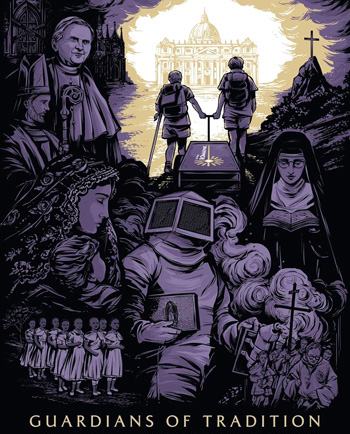
A conciliatory position,
open to all ‘reasonable’ compromises
Presenting Benedict XVI as a model Pope, it suggests that things have simply gotten out of hand during Francis’ reign. Hopefully, it opines, in the near future, traditional Catholics will have more liberty to attend the Latin Mass.
As we will see, this pacifist line of thinking undermines the authentically conservative position by paving the way for compromise with progressivist doctrines and customs.
A plea to Pope Francis
As the first two episodes focus on beauty and truth, respectively, this one strives to showcase the goodness of the Latin Mass. It revolves around La Voie Romaine, a pilgrimage of French mothers of Priestly Fraternity of St. Peter (FSSP) and the Institute of Christ the King (ICKSP) priests. The mothers determined to walk from Paris to the Vatican to deliver to the Pope 2,500 letters from persons who desire to preserve the traditional Mass.
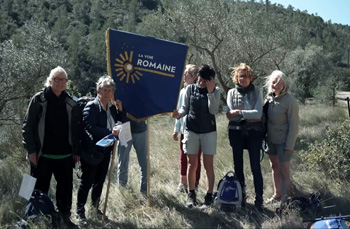
The priests’ mothers don shorts & pants for their pilgrimage; below, nothing comes from the brief presentation
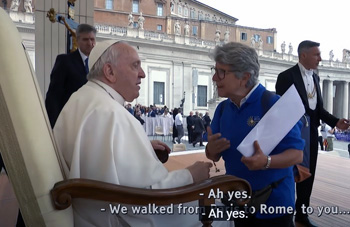
‘We walked from Paris to Rome to you.’
‘Ah,yes. Ah, yes.’
Perhaps the Pope fails to understand the good fruits of the Latin Mass, the documentary posits. He himself has only ever said the Novus Ordo; thus he might simply be out of touch with those who find great spiritual solace in Tradition.
The mothers’ attachment to the Latin Mass seems to be more a personal preference than a conviction based on a firm ideological foundation. They emphasize that this Mass has been spiritually beneficial for their sons and the wider community, yet they seem tolerant toward the Novus Ordo. One mother remarks: “A very high proportion of letters, around 40%, have been written by people who attend the Ordinary Form, who also see Traditionis Custodes as a loss.”
Because of this, it is no surprise that the mothers are tethered to modern habits. For example, they dress in shorts, sleeveless tops, and sneakers, and even fail to wear veils in church. This is an implicit denial of the broader cultural crisis in society.
The women are disappointed when, after two months of walking, the Pope only greets them from his vehicle on Vatican square and speaks shortly to one of them, who is not even wearing a skirt or the traditional black when she presents the signature petition. Nothing came of the meeting. Nothing changed in the progressivist Church.
Good fruits of the Latin Mass
To further convey the good fruits of the Latin Mass, the documentary then showcases several traditional communities. Faithful Catholics in Jalisco and Tanzania share their profound love for the Latin Mass, emphasizing that it has changed their lives. This demonstrates the universality of this ancient liturgy.
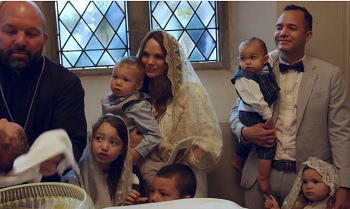
Good fruit: The large family at
a traditional Baptism of its new baby
The Soldinies explain that, to their relief, they later visited other traditional parishes that were more welcoming and less “judgmental.”After they realized tolerance has citizenship in the traditionalist churches, they appreciated this liturgy and made it a point to attend. They also learned, in due time, to dress better for Mass.
Traditionis Custodes
The documentary goes on to suggest that Traditionis Custodes may not actually reflect the desires of most Bishops. The report on the Bishops’ comments was more positive than expected. Some Bishops did call attention to “problems” with the Latin Mass: One said that “some people who support the Extraordinary Form do so with ideological presuppositions.”
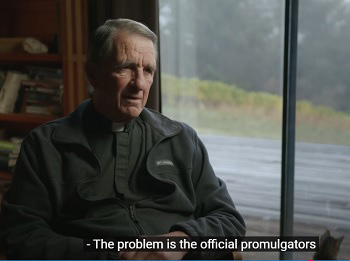
Fr Fessio of Ignatius Press puts no blame on Vatican II or the Conciliar Popes
The film commentator claims: “Bishops are seeing churches burgeoning, overflowing with young families with many kids, who are joyfully faithful to the Magisterium.” Though he does not explain what he means, it seems that he is equating the Magisterium with the post-Conciliar Church.
A questionable ideology
First, the documentary can be criticized for the bad customs that oppose the spirit of Christian modesty and decorum which it promotes. As TIA has demonstrated, good customs are an essential component of Catholic Civilization. When they decline, so does the Faith. It is not judgmental to insist upon proper dress and decorum for Mass.
Worse, the documentary adopts a middle-of-the-road position that places Traditionalism in a position of constant defense. It suggests that we must tiptoe around the modern Vatican and acquiesce to reasonable demands. Frequently we hear the affirmations that “we are not dissident” and “we do not have ideological presuppositions.” Sadly, the lady doth protest too much, methinks…
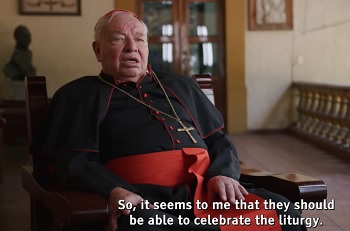
The Cardinal of Guadalajara: ‘Let them have it, but of course keep what we have also...’
Imagine if the Crusaders had laid down their weapons upon arrival in the Holy Land, declaring: “We come in peace. We do not oppose the Islamic rule; all we ask is to peacefully venerate the sites that are important to our Faith. Let the dialogue begin.” How absurd would this be?
Yet, this is not unlike the tactics this documentary employs. In truth, the progressivist takeover of the Vatican is just as insidious as the Islamic conquest of the Holy Land, for it has no legitimate rights and has distorted the face of the Church.
“Supreme Catholic intransigence is nothing but supreme Catholic charity,” wisely affirms Fr. Felix Sardá y Salvany. Rather than beg the progressivist hierarchy to retain the already compromised 1962 Latin liturgy, it is more charitable to fully and wholly resist the bad actions of the hierarchy and insist upon God’s absolute right to be worshipped in a manner befitting His infinite majesty, as well as the right of the age-old Magisterium to be restored and respected as was and always should be.

Posted March 10, 2025
______________________
______________________





